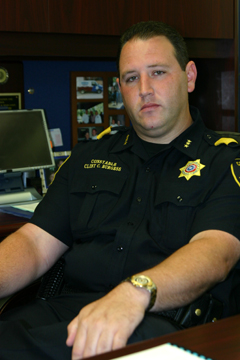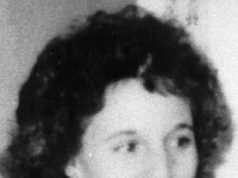 “I’ve tried to talk to him several times,” county purchasing agent Jack Beacham told county commissioners recently after they wondered aloud why Burgess hadn’t bothered to appear at a recent meeting, even though he was on the agenda to discuss his office’s use of county-paid fuel cards. Phone messages to Burgess had gone unreturned, Beacham said. After the meeting, some county officials speculated whether Burgess, elected in 2005, was turning out to be another problematic constable along the lines of Jack Allen, the conniving peace officer who was finally voted out of office in 2004 after a long series of combative and embarrassing behaviors.
“I’ve tried to talk to him several times,” county purchasing agent Jack Beacham told county commissioners recently after they wondered aloud why Burgess hadn’t bothered to appear at a recent meeting, even though he was on the agenda to discuss his office’s use of county-paid fuel cards. Phone messages to Burgess had gone unreturned, Beacham said. After the meeting, some county officials speculated whether Burgess, elected in 2005, was turning out to be another problematic constable along the lines of Jack Allen, the conniving peace officer who was finally voted out of office in 2004 after a long series of combative and embarrassing behaviors.
Burgess said he received no phone messages from Beacham about fuel cards, and he wasn’t told that he was on the commissioners’ agenda until the morning of the meeting. By then he had a conflicting appointment. A year ago, Burgess had requested seven fuel cards for his deputies to use to fill their gas tanks, but Burgess had never picked them up from county officials, something that confused the commissioners. Again, a lack of communication was the problem. “Nobody ever told us they were approved,” Burgess said.
In reality, the constable’s no-show at the recent meeting was just the tip of the iceberg. Burgess has also been outfitting his deputies with radar guns and encouraging them to issue traffic citations when the need arises — something commissioners have clearly stated they don’t want. Tarrant County constables are expected to serve custody papers and other legal documents, to seize property when required, and to leave proactive law enforcement to city cops and county deputies. County officials had already asked Burgess to turn in his radar guns, prompting Burgess to say he would bring numerous residents and constituents to the March 30 commissioners meeting to show their support for his patrolling of the Mansfield area that his Precinct 7 covers. That sounded like a threat, a vow to stand up and buck the commission that controls his budget but has no real supervisory power over him.
The demand for him to turn in the radar guns followed a Feb. 12 incident in which a couple of Burgess’ deputies pursued a fast-moving vehicle in a high-speed chase that led to a deputy shooting at the car’s tires. The driver turned out to be a juvenile, and the deputy lied about firing his weapon. To some, Burgess’ initial denials about the shooting smacked of a cover-up. While Burgess might have shown some lapses in judgment, he doesn’t appear to be in Allen’s league for sheer brashness and bullheadedness, and he insists he is keen to maintain a positive rapport with the five commissioners who control his purse strings. County peace officers who make a habit of butting heads with commissioners (anybody remember former Sheriff David Williams?) don’t stick around for long. Allen’s many alleged indiscretions, featured in a Fort Worth Weekly cover story (“You Don’t Know Jack,” Jan. 23, 2003), included sexual and racial discrimination, favoring political donors and punishing others, allowing his peace officer’s license to lapse, and hosting an annual “charity” golf tournament that sent little money to charities. “We take care of our community, but we do it professionally. We don’t do it like Jack Allen did,” Burgess said.
Burgess met with the Weekly to explain some of the recent situations that have raised eyebrows. He plans to meet with commissioners individually in the future. “My intention is to build a better understanding,” he said. Constables are one of Texas’ oldest law enforcement traditions. They are certified peace officers, but their stature has shrunk over the years as police and sheriff’s departments have taken on more importance. Tarrant County officials prefer to let police patrol the cities and sheriff’s deputies to patrol unincorporated areas, while constables stick to serving papers. Still, constables are elected officials and can run their offices as they see fit. They serve four-year terms and answer only to voters. Running radar on motorists isn’t high on his priority list, Burgess said, but neither does he discourage his deputies from pulling over dangerous drivers. The constable said that residents, particularly school officials who don’t want motorists speeding through school zones, have asked him to be on the lookout for erratic drivers who could cause accidents.
“If something happens in front of us, we have to take care of it,” he said. “I’m not going to turn an eye and then have something else happen.” The pursuit that involved shots being fired occurred after a deputy constable allegedly saw a motorist driving 64 mph in a 40 mph zone on Walnut Creek Drive near U.S. 287 in Mansfield. The chase on wet morning streets included a high-speed shortcut through a Wal-Mart parking lot and ended up on Broad Street near the Mansfield Police Department. Meanwhile, another constable’s deputy had joined in the pursuit, parked his county vehicle in a median crossover, and waited for the suspect to pass by. Police employees reported hearing gunfire and soon began fielding phone calls from residents who had heard the same thing.
“I called up to the constable’s office and was told that none of their people fired any shots,” Mansfield Police Chief Steve Noonkester said. “Then I talked to the justice of the peace, and he looked into it and was told the same thing. They denied it all that week.” Noonkester told Detective Barry Moore to find out what had happened. Moore spent about 20 hours interviewing witnesses and looking for shell casings on the side of the road. Several eyewitnesses saw the chase and said they had seen a deputy constable fire shots at the car. Moore also talked to the juvenile who had been fleeing. According to his report, the young man told him “an officer shot at him as he went by … [and he] ducked under the steering wheel.” The report’s conclusion: “I find that an unknown constable fired his service weapon at the fleeing vehicle,” Moore wrote.
Later, Moore told the Weekly that, beyond just denying shots had been fired, the constable’s office hadn’t exactly been cooperative with police. Moore resented wasting valuable time on the inquiry when he had plenty of other cases needing his attention. “After looking into it and having all these eyewitnesses, we had a situation where I don’t know if they were intentionally covering things up or if they just weren’t doing an investigation and were done with it,” he said. “If somebody is shooting and not reporting it, we have a problem.” Later, Burgess called police and changed his story; one of his deputies had indeed fired his weapon. Some folks theorized that Burgess had been covering up for an officer and only admitted to the shooting after Moore made his report. Burgess said he denied that a shooting took place only because he believed his deputies, who denied firing their weapons. After about a week, however, Deputy Bradley Elliott admitted he had used his sidearm.
“He was immediately put on suspension,” Burgess said. The constable said he planned on firing Elliott for lying, but the deputy quit instead. “He came in and said he thought it was best that he resign,” Burgess said. “We’re not going to hide anything.” Burgess understands that the incident led some Mansfield police officers and county employees to wonder what was happening on his watch. Even though cops and county officials don’t control him, he knows the importance of getting along. But he also realizes the value of taking care of his constituents and understands that law enforcement isn’t always pretty. “We have two people we work for — we have the community, and we have the commissioners court,” he said. “We have to balance that, and sometimes even when the commissioners court says they don’t want something, the community is still calling and asking for it.”











